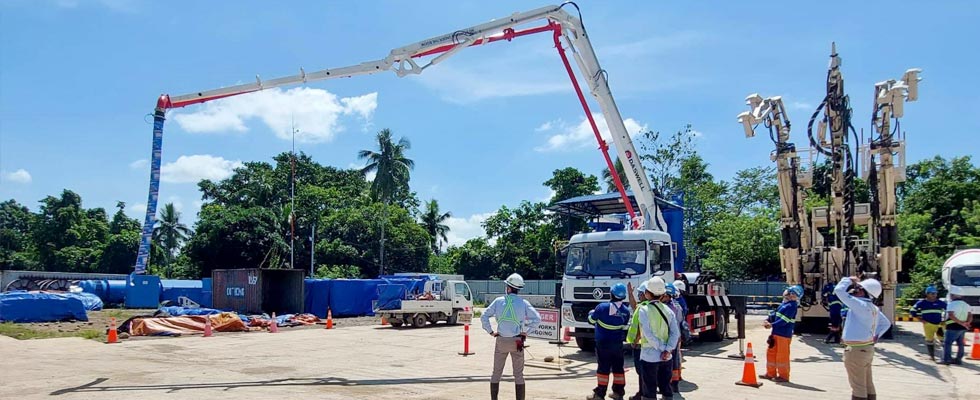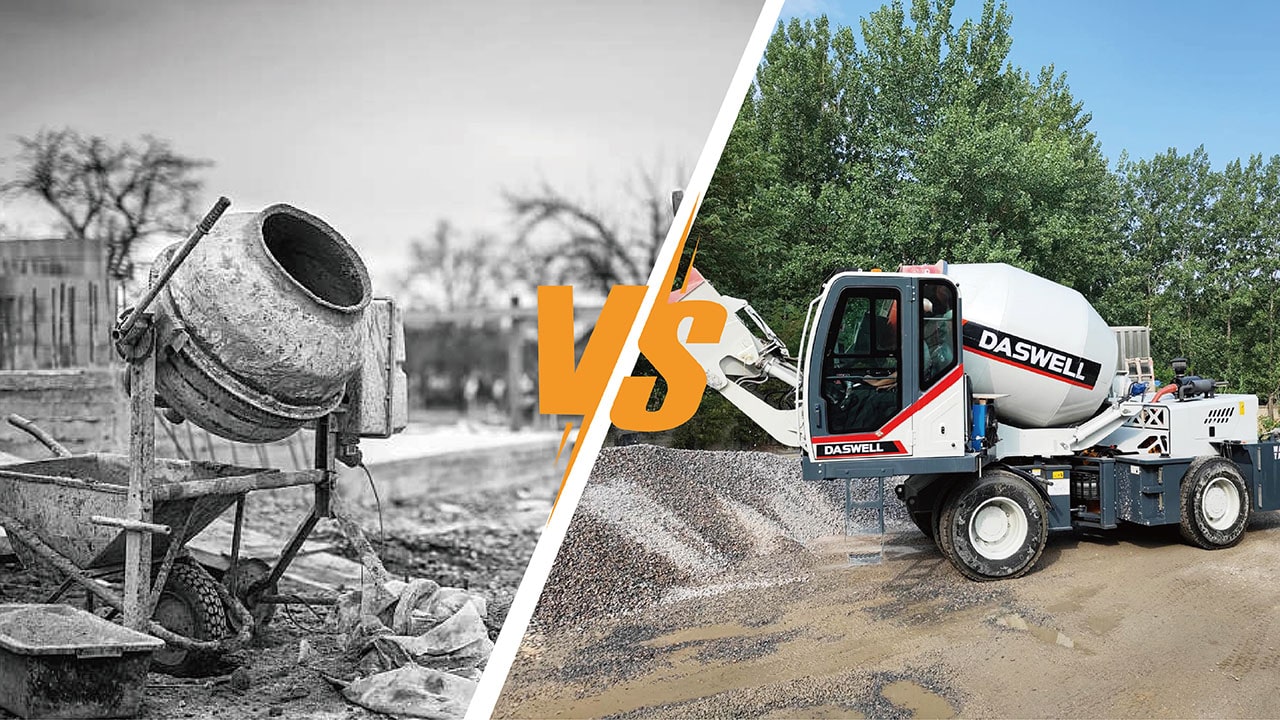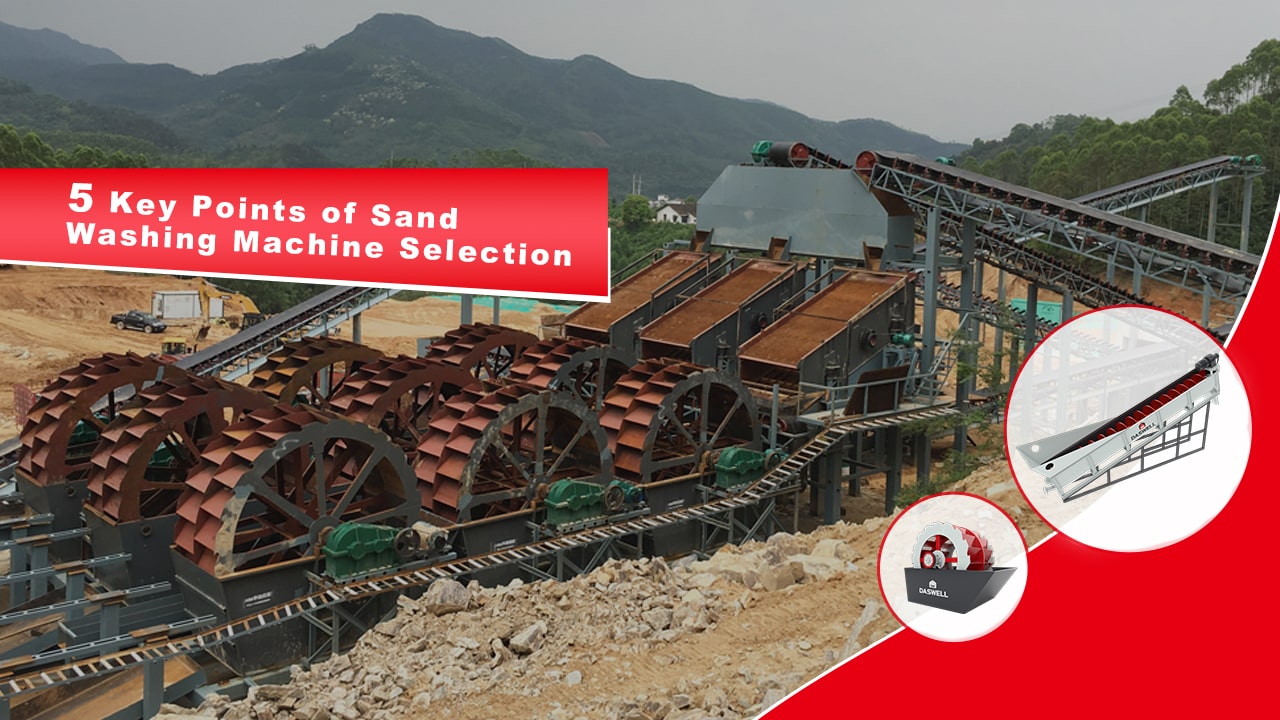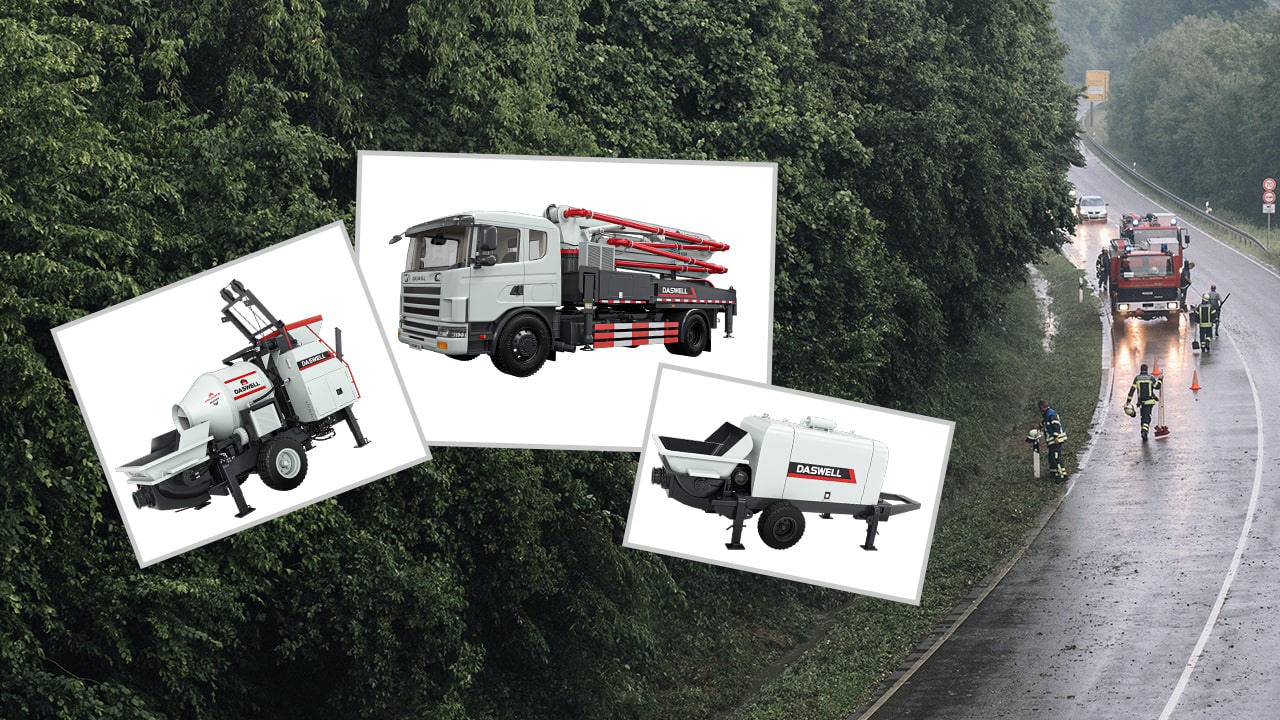Asphalt Road VS Concrete Road: Pros and Cons
The development of road traffic directly affects the development of the national economy and the improvement of people’s living standards. Today, the world’s roads mainly include asphalt roads and concrete roads.
Cement concrete pavement is a pavement structure with strong bearing capacity and good stability, and its raw materials are readily available and cheap, so it is widely used. Asphalt pavement has good mechanical properties. Although the raw materials are relatively expensive and non-renewable resources, they are widely used because of their high comfort and safety.
So, what are the advantages and disadvantages of these two road surfaces? What kind of road surface should we choose under different conditions?
Asphalt road

Advantages
Strong adaptability. Asphalt road is a flexible pavement, and the flexible pavement has a strong adaptability to the uneven settlement and deformation of the foundation and subgrade. Concrete roads have higher requirements for foundations and subgrades.
High comfort. The asphalt road is relatively soft. Due to the double shock absorption of the wheels and the road surface, the road surface vibration is small and the noise is low when driving, which makes the passengers feel very comfortable during driving.
Low construction difficulty. When laying asphalt roads, a lot of professional equipment is required. Although the investment in equipment is high, the process is relatively simple and efficient.

Simple maintenance. If a few kilometers of asphalt road is damaged and needs to be repaired, it only takes one night to complete it, and it can be opened to traffic as usual the next day.
Poor road reflection. Asphalt road is a black pavement, which has poor reflection ability to light. On the highway, the asphalt pavement can effectively relieve the driver’s visual fatigue.
Disadvantages
Poor water resistance. A large amount of coarse aggregate and fine aggregate are used in the paving process of asphalt road, so that there are a lot of voids inside. If it is soaked in rain for a long time, it will cause the asphalt to lose its viscosity, causing the interior to loosen and damage the road surface.
High maintenance cost. Although asphalt road is fast to repair, it is more expensive. Even if the repair section is short, a full set of equipment is required.

Poor environmental protection. Asphalt pavement is a non-degradable material, which will pollute the surrounding land and groundwater during use. Moreover, some harmful gases will be produced during the heating and paving of asphalt, which will have a certain impact on the construction personnel and the surrounding air.
High fuel consumption. The research shows that when the vehicle speed reaches 60km/h, the concrete road saves 8% of the fuel consumption compared with the asphalt road. When the vehicle speed reaches 120km/h, the fuel consumption can be saved by 15%.
Concrete road

Advantages
Strong bearing capacity and good stability. Concrete pavement is a rigid pavement with high bearing capacity, and its edges are also very strong, not easy to be crushed, so it is not necessary to lay curbstones. Moreover, it will not change greatly due to sudden changes in temperature, and has good stability.
Good durability. Due to the strong bearing capacity and good stability of the concrete road, it can be used as usual even if it is soaked in floods or exposed to the sun for a short period of time. It will not affect the pavement and will not soften the ruts like asphalt pavement.
Long service life. Experiments have shown that the service life of concrete road is twice that of asphalt road.

Abundant raw materials and high economic benefits. One of the main raw materials for concrete pavements is cement. Cement has the characteristics of large production, wide distribution, cheap and easy availability. So this makes the pavement construction cost low.
Disadvantages
Low comfort. Concrete road is a rigid pavement with a high modulus of rigidity. The noise is slightly louder, and the shock absorption ability is poor, which affects the comfort of the road surface.
Difficult to maintain. When the concrete pavement is damaged, the whole concrete slab needs to be broken and cleaned, rather than just repairing the damaged pavement like the asphalt pavement.
Too many seams. Concrete pavements are constructed with a large number of seams. These seams will not only increase the difficulty of road construction and maintenance, but also easily affect the comfort of driving.

White pavement is highly reflective. Although white roads are good for driving at night, they are highly reflective during the day and can easily cause eye fatigue. Therefore, asphalt roads are often used on highways in many places.
How are asphalt vs concrete roads made?
Let’s take a look at the production process of asphalt road and concrete road.
Construction technology of asphalt road
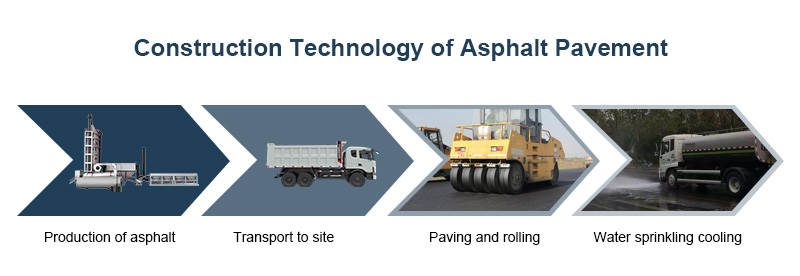
First of all, bitumen, aggregate, mineral powder, water, etc. are used as raw materials, and the asphalt mixture is produced in batches by using an asphalt mixing plant.
Next, the finished asphalt mixture is transported to the construction site by dump truck. The finished asphalt transported to the site needs to be used in time. If the temperature of the asphalt mixture is not up to the required temperature, or if the asphalt mixture has condensed into lumps, it should not be used.
The asphalt concrete paver then begins to pave the asphalt slowly, evenly and continuously. After paving, the paved asphalt is rolled by the road roller. The rolling should not be less than 2 times until there are no obvious rolling trace.
Finally, when the temperature of the pavement naturally drops below 50°C, the asphalt pavement can be put into use. If you need to start opening to traffic in advance, you can sprinkle water to cool down and reduce the road surface temperature.
Construction technology of concrete road

First of all, the raw materials for the production of concrete mainly include cement, aggregate, additives, water, etc. The strength of concrete required for different road grades is also different. Therefore, it is necessary to determine the proportion of concrete first, and then use concrete mixing equipment to produce concrete according to different proportions.
The concrete mixer truck then transports the finished concrete to the construction site. It needs to be poured immediately after being transported to the site. When pouring, the material should be unloaded evenly, and the speed of material distribution should be adapted to the speed of paving.
Finally, the concrete pavement should be maintained immediately after it is poured, and can be maintained by spraying curing agent or heat preservation covering. When the concrete fully reaches the designed flexural tensile strength, the road can be put into use.
Asphalt road VS Concrete road, which is better?
In order to choose a more suitable pavement type, we can compare and analyze these two types of pavements.

Comparison of driving comfort
Driving comfort depends on the smoothness of the road surface. The smoothness of pavement is one of the important indicators of pavement performance. Especially on the expressway, the speed of the vehicle is generally faster, and the requirements for the smoothness of the road surface are higher.
Generally speaking, the smoothness of asphalt pavement is higher than that of concrete pavement. Moreover, asphalt pavement is an elastic plastic material with good elasticity.
Comparison of driving operating costs
Asphalt road is a flexible pavement. When the car is driving on this kind of road, the phenomenon of “deflection basin” under the wheels will make the car’s fuel consumption increase.
Concrete pavement is a rigid pavement. When the vehicle is driving on this kind of road, the pavement has only a slight deflection, which is negligible, so the economy of concrete pavement is better.
Impact on the ecological environment
On the one hand, from the perspective of raw materials, concrete pavement can use industrial waste residue, fly ash and other raw materials to realize the comprehensive utilization of waste. The raw material of asphalt pavement is mainly the product under the comprehensive action of petroleum. We all know that petroleum is a non-renewable resource, so in terms of resource recycling, concrete pavement is even better.
On the other hand, asphalt is a refractory particle, and it will have a certain impact on the surrounding soil, water sources and residents during use.
Comparison of service life
The experiment show that under the same traffic flow, the same loading capacity, and the same structural design, the service life of the asphalt pavement is relatively short. The service life of concrete pavement is about twice that of asphalt pavement.
Comparison of maintenance costs
Compared with concrete pavement, asphalt pavement will be easier to build and maintain, and, after the road is built, it can be put into use and start to open to traffic as soon as possible. However, in terms of later maintenance and repair of the road, the cost of asphalt pavement is much greater than that of concrete pavement.
To sum up, we will find that both asphalt pavement and concrete pavement play an important role in road engineering, and they have their own advantages and disadvantages. After comparative analysis, we can see that the advantages and disadvantages of asphalt pavement and concrete pavement have complementary characteristics.
Therefore, when making the choice of pavement, we should listen to the advice of technical personnel according to the local geological conditions, weather conditions, material resources, etc., and consider all aspects so as to choose the right pavement and ensure the quality of the road.
From the above, we can draw the following conclusions:
- In cities with variable climate, hot, cold, and rainy weather, it is recommended to choose concrete pavement;
- In areas with stable, mild climate and moderate precipitation, it is recommended to choose asphalt pavement;
- In plain areas or areas with stable foundations, it is recommended to choose concrete pavement;
- In mountainous areas with complex landforms and unstable foundations, it is recommended to choose asphalt pavement;
- In remote areas where economic development and technological development are relatively backward, it is recommended to choose concrete pavement;
- In areas with rapid economic development, it is recommended to choose asphalt pavement.
